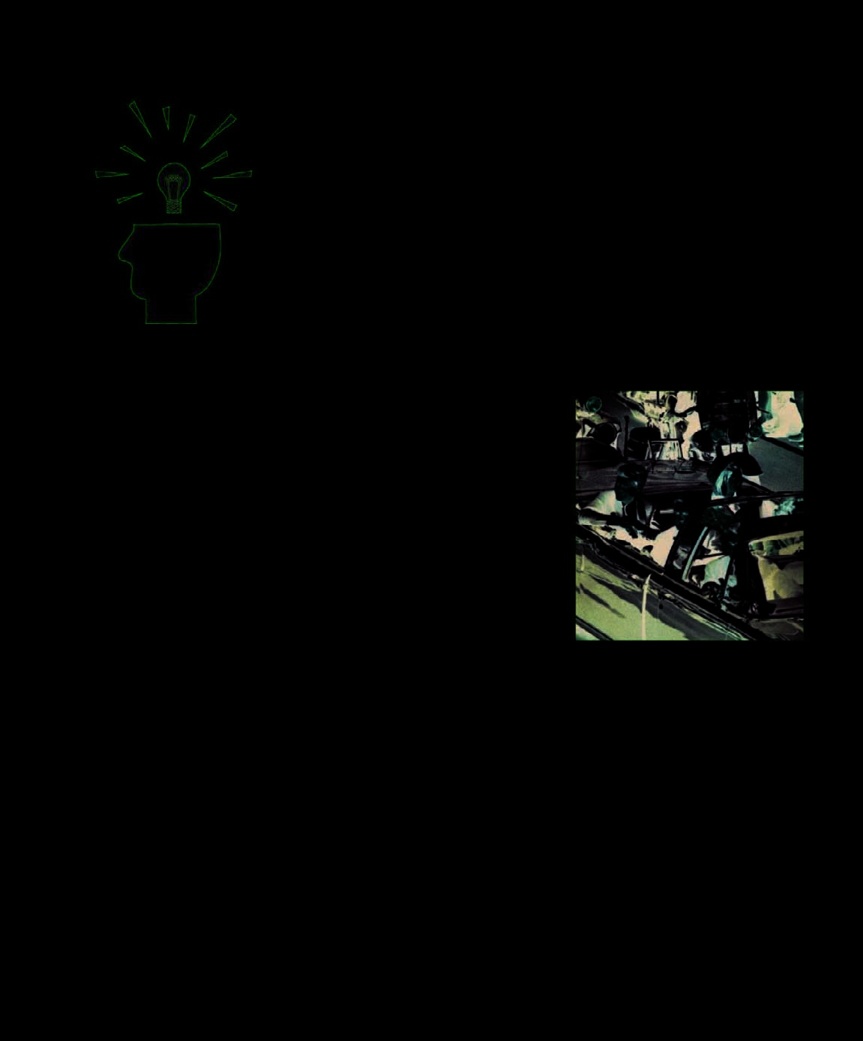The Psychology Book (74 page)
Read The Psychology Book Online
Authors: Unknown

begun to mimic each others’
during the Nazi invasion of
simplistic, as it doesn’t take into
expressions in the process of
Poland. Two weeks later, their
account other possible effects of
empathizing, resulting in similar
building was bombed and both
frequent exposure.
wrinkle patterns over time.
of his parents were killed. He
One study used banner ads to
Known for the breadth of his
spent six months recuperating
test the mere exposure effect on
work on the basic processes of
in a hospital, after which he
college-aged students. Subjects were
social behavior, Zajonc helped
was arrested by Nazi soldiers
presented with an article to read on
to create the modern field of social
and sent to a German labor
a computer screen while banner ads
psychology. He used his work on
camp. He escaped with two
flashed along the top of the screen.
thought and feeling to explore
other prisoners and walked
The results indicated that those who
issues such as racism, genocide,
200 miles (320km) to France
had been exposed more frequently to
and terrorism, hoping that research
only to be recaptured and
the banner ads did indeed rate the
could ultimately help to prevent
imprisoned again. He broke
ads more favorably than those who
war and human suffering.
out for a final time and made
■
his way to the UK.
had seen it less frequently or not at
After World War II, Zajonc
all. However, another study found
moved to the US, where he
that familiarity with a brand name
established himself as an
can create an ambivalent attitude.
eminent psychologist, gaining
This may be because people have
psychology degrees to PhD
both good and bad associations
level at the University of
with familiar companies, and all of
Michigan. He worked there
these associations are brought to
until his retirement in 1994,
mind with frequent exposure,
when he became an emeritus
leading to greater ambivalence. As
professor at Stanford University.
a result, it is unclear whether mere
Zajonc died of pancreatic
familiarity, created through repeated
cancer at the age of 85.
advertising, is good for sales.
Key works
Familiar faces
1968
Attitudinal Effects of
Zajonc found that not only does
Couples grow to resemble each
Mere Exposure
exposure influence how a person
other
over time because they express
1975
Birth Order and
feels about someone, but it can
empathy through reflecting each
Intellectual Development
even change the way a person
other’s facial expressions; this leads
1980
Feeling and Thinking
looks over time. With a group of
to the formation of similar facial lines.

236
WHO LIKES
COMPETENT
WOMEN?
JANET TAYLOR SPENCE (1923– )
IN CONTEXT
APPROACH
U
ntil the women’s liberation intellectual leadership, and social
movement took hold in the
and economic freedom. The results
1970s, Janet Taylor Spence’s
were surprising. Contrary to the
research had focused primarily on
researchers’ expectations, subjects
Gender studies
anxiety. However, after reading a
not only preferred more competent
BEFORE
study conducted by two of her
to less competent women, but even
colleagues about how competence
awarded the highest ratings to the
1961
Albert Bandura develops
in men correlated with likeability,
women who were competent in
social learning theory, which
the American psychologist turned
stereotypically masculine ways.
suggests that boys and girls
to issues relating to gender. Noticing
This landmark study was
behave differently because
that the study did not consider
seminal in launching gender
they are treated differently.
the female gender, she decided to
research as a subcategory within
1970
Robert Helmreich
conduct a similar study that focused
the field of social psychology. ■
and Elliot Aronson publish a
entirely on women. The resulting
study showing that men find
paper—
Who likes competent
competent men more likeable
women?
—was published in 1972.
than incompetent ones.
Working with Robert Helmreich,
Taylor Spence set out to test
AFTER
whether men and women preferred
1992
US psychologist Alice
competent women to incompetent
Even our conservative
Eagly finds that women are
ones. The two psychologists
subjects… rated highest
evaluated more negatively
suspected that only people who
the woman who was
when they display leadership in
believed in sexual equality would
competent in stereotypically
a traditionally masculine way.
prefer competence. To test their
masculine areas.
hypothesis, they designed the
Janet Taylor Spence
2003
Simon Baron-Cohen
Attitudes Toward Women Scale,
suggests the female brain is
which assesses attitudes toward
predominantly hardwired for
the roles and rights of women by
empathy, whereas the male
asking questions about education,
brain is hardwired for
marriage, professional life, habits,
understanding systems.
See also:
Sigmund Freud 92–99 ■ Guy Corneau 155 ■ Eleanor E. Maccoby 284–85 ■ Albert Bandura 286–91 ■ Simon Baron-Cohen 298–99

SOCIAL PSYCHOLOGY 237
FLASHBULB
MEMORIES ARE FIRED
BY EVENTS OF HIGH
EMOTIONALITY
ROGER BROWN (1925–1997)
IN CONTEXT
APPROACH
I
n the late 1970s, Harvard
University professor Roger
Brown co-wrote a paper
called
Flashbulb Memories
that
Memory studies
became the classic study on a
BEFORE
memory phenomenon. Brown and
his colleague, James Kulik, coined
1890
William James makes a
this term to refer to a special kind
distinction between short-term
of autobiographical memory in
(primary) memory and long-
which people give a highly detailed,
term (secondary) memory.
vivid account of the exact moment
1932
Frederic Bartlett’s
that they learned about an event
studies show that recollective
with a high shock value.
memory is not simply a matter
The paper argues that culturally
of retrieval; it is an active
and personally significant events,
reconstruction of past events.
such as the shooting of J.F. Kennedy
The assassination
of President
or Martin Luther King, trigger the
John F. Kennedy in 1963
was shocking
AFTER
operation of a special biological
and culturally significant. Brown
1982
US psychologist Ulric
claims these kinds of events cause
memory mechanism (“now print”)
Neisser argues that flashbulb
the formation of “flashbulb” memories.
that creates a permanent record of
memories do not use a special
the event and the circumstances in
mechanism and can be
which we first become aware of it.
However, researchers such as Ulric
inaccurate due to multiple
Almost like a flash photograph, we
Neisser have contested the special
“rehearsals” after the event.
can picture where we were, who we
mechanism theory, suggesting that
were with, and what we were doing
1987
In
Autobiographical
the memories’ durability stems from
when we heard the shocking
Memory,
American
the fact that they are thought about
news—such as the destruction of
psychologist David Rubin
(or rehearsed) repeatedly after the
the twin towers on 9/11. Brown and
event, by the individual and the
suggests that we remember
Kulik claim these memories are
wider world, and so are continually
landmark events that define
vivid, accurate, and enduring.
reinforced within memory. ■
us as people.
See also:
William James 38–45 ■ Jerome Bruner 164–65 ■ Endel Tulving 186–91
■ Frederic Bartlett 335–36 ■ Ulric Neisser 339

238
THE GOAL IS
NOT TO ADVANCE
KNOWLEDGE, BUT
TO BE IN THE KNOW
SERGE MOSCOVICI (1925– )
IN CONTEXT
We overhear something
This
merges
with other
APPROACH
that
arouses our
things we know or
Social constructivism
curiosity
.
have experienced.
BEFORE
1807
German philosopher
Georg Hegel says that our
ideas and values are fashioned
by the
zeitgeist
, or spirit of the
Everyone is eager to
age, which constantly changes
We chatter about this
transmit knowledge and
through the reconciliation of
with other people and
keep a place in the circle
opposing views.
share our thoughts
.
of conversation
.
1927
German physicist Werner
Heisenberg’s “Uncertainty
Principle” reveals that the
observer affects the observed.
1973
American psychologist
The
collective
Attitudes become
Kenneth Gergen writes
Social
conversations
continue,
organized and
values
Psychology as History
, which
allowing everyone
become established
.
marks the emergence of
to know more.
social constructivism.
AFTER
